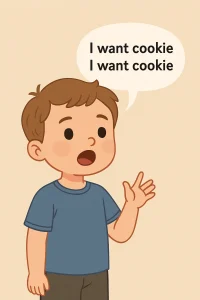Confused by Social Cues? Unlock Social Communication Disorder
By Rajini D
Last Updated: April 27, 2024
Social Communication Disorders (SCD) are conditions where individuals face significant challenges in using verbal and nonverbal skills appropriately in social contexts. Unlike simple miscommunication, SCD affects how individuals understand and use language in conversations, making it hard for them to convey their thoughts and emotions effectively. This can lead to misunderstandings and frustrations in everyday interactions, impacting relationships, academic performance, and overall quality of life.
Understanding Social Communication Disorders
What Exactly Are Social Communication Disorders?
Social Communication Disorders encompass a range of difficulties that affect the verbal and nonverbal communication skills necessary for effective social interactions. These are not just about struggling to find the right words; they involve challenges with the way individuals understand, process, and use language in social settings. People with SCD might find it hard to follow the rules of conversation, adjust their language to suit different social contexts or read nonverbal cues like facial expressions and body language.
Symptoms in Everyday Life
To give you a clearer picture, let’s consider some examples of how these symptoms can manifest:
- Contextual Variability: Imagine someone who speaks to their boss with the same casual tone they use with their close friends. They might not adjust their speech for formality or context, which can lead to misunderstandings or perceived disrespect.
- Misreading Nonverbal Cues: Think about a person who cannot interpret body language or facial expressions well. They might not recognize when someone is disinterested or uncomfortable in a conversation, leading to social faux pas.
- Difficulty with Turn-taking: Conversations require a give-and-take flow. A person with SCD might struggle with this, either by dominating the conversation or by not participating enough, making social interactions challenging.
- Problems Understanding Implicit Content: Sarcasm, jokes, and indirect language are parts of everyday communication that can be confusing for someone with SCD. They may take things very literally, missing subtleties that could lead to misunderstandings.
Signs of Social Communication Disorder by Age Group
| Age Group | Common Signs |
|---|---|
| Preschool | Limited use of gestures, difficulty initiating conversation, does not adapt language for listener or situation. |
| School-Age | Challenges in understanding jokes or figurative language, difficulties staying on topic, and trouble with making inferences during conversations. |
| Adolescents | Awkwardness in social settings, misunderstanding nonverbal cues, difficulty understanding complex social cues. |
| Adults | Difficulty in maintaining friendships and professional relationships, misinterpretation of social norms, and challenges in adapting communication in varied social contexts. |
Causes and Diagnosis of Social Communication Disorders
Possible Causes of Social Communication Disorders
The exact causes of SCD are not fully understood, but researchers believe a combination of genetic, neurological, and environmental factors may play a role. Some individuals may have a family history suggesting a genetic predisposition to communication challenges. Neurological factors can also influence language development, affecting how an individual processes and uses language in social situations.
Diagnostic Process for Social Communication Disorders
The diagnostic criteria include:
- Persistent Difficulties in the Social Use of Verbal and Nonverbal Communication: This may manifest as inappropriate responses in conversation, difficulties in changing communication to match the context, and challenges in following rules for storytelling or conversational etiquette.
- Impact on Social Participation, Relationships, or Academic Achievement: Individuals with SCD often experience significant challenges in social interactions, which can affect their personal relationships and educational or occupational performance.
- Onset of Symptoms in the Early Developmental Period: Although these difficulties are present from an early age, they may only become fully apparent as the social demands exceed the individual’s capacities.
- Symptoms Are Not Attributable to Another Medical or Behavioral Condition: While SCD can co-occur with other disorders like ASD or ADHD, the diagnosis is made when the communication issues are not better explained by another condition.
Differentiating Social Communication Disorders from Other Disorders
Navigating the complex world of developmental disorders can be challenging, especially when many conditions have overlapping symptoms. Social Communication Disorder (SCD), Autism Spectrum Disorder (ASD), and Attention-Deficit Hyperactivity Disorder (ADHD) share some common traits but are distinct in key ways.
Social Communication Disorder (SCD) vs. Autism Spectrum Disorder (ASD)
SCD and ASD both involve difficulties with social communication skills. However, the key difference lies in the presence of restrictive, repetitive patterns of behavior, interests, or activities, which are hallmark symptoms of ASD but not associated with SCD. Individuals with ASD might have challenges with social-emotional reciprocity and may engage in repetitive behaviors or have highly focused interests. In contrast, those with SCD primarily exhibit challenges related to understanding and using language in social contexts, such as difficulty following rules of a conversation, changing language to match the situation, or making inferences and understanding non-literal language.
Social Communication Disorder (SCD) vs. Attention-Deficit Hyperactivity Disorder (ADHD)
While SCD focuses on difficulties with social communication, ADHD is characterized by a pattern of inattention and/or hyperactivity-impulsivity that interferes with functioning or development. Individuals with ADHD might interrupt others, struggle to wait their turn in conversations, and may act without thinking through the consequences. Although there is some overlap in behavioral symptoms with SCD, the core issue in ADHD lies in the attentional and impulsivity challenges, not primarily in the social use of communication.
Overlapping Symptoms
Despite their differences, SCD, ASD, and ADHD can share some overlapping symptoms, particularly in social settings. For example, individuals with any of these disorders might find it challenging to maintain a conversation or may interrupt others. This overlap can sometimes complicate diagnoses, making careful evaluation critical.
Impacts of Social Communication Disorders on Daily Life
Social Communication Disorders (SCD) can have profound effects on a person’s life, touching everything from close personal relationships to academic and workplace success.
Interpersonal Relationships
Imagine the case of Jay, a young adult with SCD. Jay often misinterprets social cues and struggles to follow the natural flow of conversation. This has made it difficult for him to form close friendships, as his responses can sometimes seem out of sync with what others expect. For instance, he might laugh at a serious comment or fail to respond appropriately to a friend’s news, leading to misunderstandings and frustration on both sides.
Academic and Work Performance
In the classroom or workplace, the impacts of SCD can be equally challenging. Consider Anita, a high school student who has trouble with turn-taking and topic maintenance during group discussions. Her peers might perceive her as dominating or uninterested in others’ opinions, which affects her group work evaluations and peer relationships.
Navigating the Challenges
Recognizing the impacts of SCD is crucial for developing effective support systems. Families, educators, and employers can play significant roles in providing the right accommodations, such as clear and direct communication and creating an understanding environment. This can help individuals with SCD navigate social interactions more successfully and feel more integrated into their communities.
How Wellness Hub Can Support You
At Wellness Hub, we understand the challenges that come with Social Communication Disorders (SCD) and the impact they can have on one’s daily life and relationships. Our dedicated team of professionals is committed to providing support and solutions that can make a real difference.
Reach Out for Professional Advice and Support
If you or someone you know is struggling with social communication, we encourage you to reach out to us. Early intervention is key, and our team is here to guide you through the process of assessment, diagnosis, and treatment. We believe that with the right support, every individual has the potential to improve their communication skills and lead a more fulfilling life.
Visit our contact page to schedule a consultation or learn more about how we can help. Let Wellness Hub be your partner on this journey towards better communication and enhanced social interactions.
At Wellness Hub, we’re not just about treatment; we’re about transforming lives. Our commitment is to provide support that not only addresses the challenges but also celebrates the strengths of each individual we work with. Together, we can achieve the communication goals that are crucial for success in every aspect of life.
Conclusion
Social Communication Disorders (SCD) can be complex, affecting how people connect and interact every day. In this article, we’ve covered what SCD is, how it differs from other disorders like ASD and ADHD, and its impact on personal and professional lives. We’ve also highlighted effective treatments and strategies that help manage these challenges.
At Wellness Hub, we’re here to support anyone struggling with social communication. Early intervention is crucial, and getting the right help can make a big difference. We encourage you to explore our services and reach out for support. Learn more about how we can help or schedule a consultation today. Together, we can overcome communication barriers and build stronger connections.
Frequently Asked Questions:
1. What exactly is a social communication disorder?
Social communication disorder involves difficulties in using verbal and nonverbal communication effectively in social situations. This includes challenges with conversational skills, understanding non-literal language, and adapting communication in different contexts.
2. How is social communication disorder different from autism?
Unlike autism, which includes restricted interests and repetitive behaviors, social communication disorder primarily involves challenges with the social use of verbal and nonverbal communication without the broader behavioral symptoms.
3. Can adults be diagnosed with social communication disorders?
Yes, adults can also be diagnosed with social communication disorders. Although many cases are identified in childhood, some individuals may not receive a diagnosis until adulthood, especially if their symptoms are mild or overlooked in earlier years.
4. What are the signs of social communication disorder in children?
Signs in children include difficulties with taking turns in conversation, using appropriate language for different social settings, understanding jokes or sarcasm, and maintaining topics during discussions.
5. What treatment options are available for social communication disorder?
Treatment often includes speech therapy to improve pragmatic language skills, social skills training groups to practice communication, and sometimes behavioral therapy to address specific challenges in social interaction.
6. How can schools support children with social communication disorders?
Schools can help by providing tailored educational programs, speech therapy, and social skills training, as well as making accommodations in the classroom to support better communication and learning.
7. What role do parents play in managing a child’s social communication disorder?
Parents can play a crucial role by advocating for their child’s needs, participating in therapy sessions to learn supportive communication techniques, and creating a supportive home environment that encourages communication development.
8. Is there a cure for social communication disorder?
While there is no cure for social communication disorders, many individuals can improve their communication skills significantly through tailored therapies and interventions. Ongoing support is often necessary to help manage symptoms effectively.
9. Can social communication disorders affect career opportunities?
Yes, social communication disorders can impact career opportunities and job performance, particularly in roles requiring strong interpersonal communication and teamwork. However, with appropriate strategies and workplace accommodations, individuals can succeed professionally.
10. What support services does Wellness Hub offer for those with social communication disorders?
Wellness Hub provides a range of support services, including individualized speech therapy, group social skills training, and educational resources. Our dedicated team works to develop personalized treatment plans that cater to the unique needs of each individual.
About the Author:
Rajini Darugupally
M.Sc., Speech-Language Pathologist (9+ years of experience)
Rajini is a passionate and dedicated Speech-Language Pathologist with over 9+ years of experience, specializing in both developmental speech and language disorders in children and rehabilitation in adults. Driven by a desire to empower each individual to find their voice, Rajini brings a wealth of experience and a warm, genuine approach to therapy.
Currently, at Wellness Hub, she thrives in a team environment that values innovation, compassion, and achieving results for their clients.
Connect with Rajini to learn more about how she can help you or your loved one find their voice.
Book your Free Consultation Today
Parent/Caregiver Info:
Client’s Details:
* Error Message








